Profile by Karen Delaney, January 2018
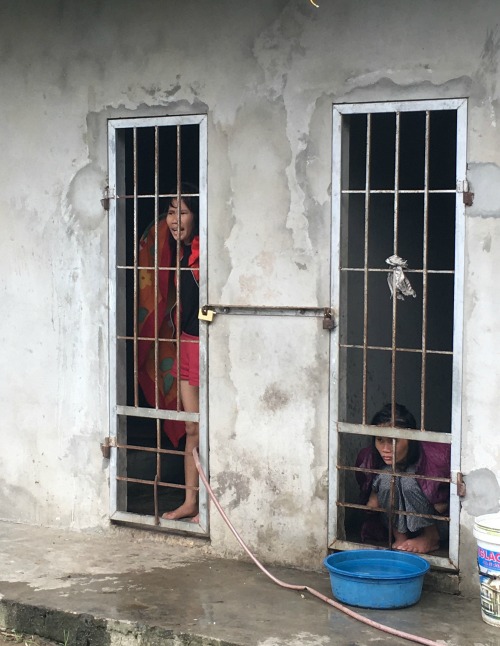 Mrs. Hue is working when we arrive at her house. She immediately takes us behind her house to see her two daughters who are locked up in “cage-like rooms”. Her daughter, Duong Thi Hoang Thanh is upset at seeing us. Ngoc, my translator, tells me she is screaming nonsense and bad words at us. She hides as soon as I take my camera out. Right of her is her sister Duong Thanh Binh, who is kneeling down by the “door”. She smiles and waves at me. Mrs. Hue is working when we arrive at her house. She immediately takes us behind her house to see her two daughters who are locked up in “cage-like rooms”. Her daughter, Duong Thi Hoang Thanh is upset at seeing us. Ngoc, my translator, tells me she is screaming nonsense and bad words at us. She hides as soon as I take my camera out. Right of her is her sister Duong Thanh Binh, who is kneeling down by the “door”. She smiles and waves at me.
No one seems surprised that the girls are locked up and no one gets offended by the words they say. Nguyen Van Thuan, the outreach worker tells us that the last time he visited this family, the girls chased him with a knife and hit another man on the head with a bowl. He said he was very scared.
Thanh, comes out of hiding, back to scream at us. Mrs. Hue tells me to take her picture then. We go inside to talk to Mrs. Hue, but we can still hear the girls screaming and then singing.
Mrs. Hue was a soldier in the war and was herself directly exposed to Agent Orange. She tells us that her hands shake and sometimes she faints. There is no one there to take care of her. She receives 1.4 Million dong ($60) per month as AO compensation. Her husband was also in the army from 1972-1975. When he was alive, he had a problem with his kidneys. He died of a brain hemorrhage, but Mrs. Hue can’t remember when.
Mrs. Hue and her husband had 6 children, and the first five are victims of Agent Orange. The youngest one, however, is starting to “talk things that don’t make any sense”, Ngoc tells me.
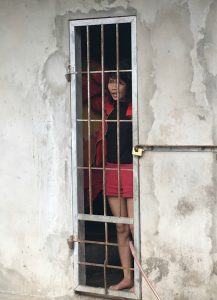 Their oldest son, Duong Viet Hieu (40), is married with four children and lives with his wife. He has kidney problems, but I’m told his children are fine. He does not receive compensation as an AO victim. Their oldest son, Duong Viet Hieu (40), is married with four children and lives with his wife. He has kidney problems, but I’m told his children are fine. He does not receive compensation as an AO victim.
The second child, Huyen (35), has throat cancer and receives 800k dong ($35usd) per month as Agent Orange compensation. She doesn’t live with Mrs. Hue so we don’t know much about her. The third, and fourth child – Duong Thanh Binh (28), and Duong Thi Hong Thanh (26) – live in the back locked up. They started having “mental problems” when they were 14-15 years old. Mrs. Hue tells us they used to live with her in the house, but then they started fighting each other and running after neighbors with knives. Mrs. Hue became very scared of her daughters, so she locked them up with the help of her neighbors in 2013. Neither can recognize their mother. Binh has a nine-year-old daughter, but Mrs. Hue tells me the father left. AEPD is trying to find an orphanage to take the granddaughter as Mrs. Hue can’t raise her. The two sisters do not get any compensation as AO victims, because they receive a “death allowance” of 1.3 million dong ($55) per month from their father. Ngoc says it’s complicated, but that one person can either receive a death allowance or AO compensation, not both.
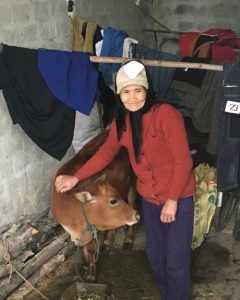 There is medication available for the girls, but they refuse to take it, and Mrs. Hue tells me “no one can make them”. Sometimes she puts the medication in their food, but they recognize the taste and spit it out. The medication cannot reverse their mental state, but it is supposed to help them sleep and eat. They’ve been locked up for four years, so I ask how they were able to run after the outreach workers. Ngoc tells me sometimes they pretend they are alright and convince their mother to let them out. Mrs. Hue, as a mother, wants to “let them be free”. However, they go back to being aggressive and she has to lock them back up. There is medication available for the girls, but they refuse to take it, and Mrs. Hue tells me “no one can make them”. Sometimes she puts the medication in their food, but they recognize the taste and spit it out. The medication cannot reverse their mental state, but it is supposed to help them sleep and eat. They’ve been locked up for four years, so I ask how they were able to run after the outreach workers. Ngoc tells me sometimes they pretend they are alright and convince their mother to let them out. Mrs. Hue, as a mother, wants to “let them be free”. However, they go back to being aggressive and she has to lock them back up.
The fourth child, Duong Viet Thanh (23) is in prison for injuring someone with a knife. AEPD tells me they think his mental state is a consequence of Agent Orange, but since he is locked up, they can’t prove anything. The younger brother, Duong Viet Doan (18), lives with Mrs. Hue. He was away during our visit, but Ngoc and the outreach worker tell me he doesn’t make much sense when he talks, and he “wanders around” most of the time.
AP’s 2016 Peace Fellow to AEPD, Ai Hoang, fundraised for this family. AEPD used the money to give Mrs. Hue a cow and a calf. She is raising the animals for sale and plans to use the money to renovate her house.
Update by Marcela De Campos, October 2018
I’d like to preface this post by saying this visit was the most emotionally challenging for me. Ms.Hue is comfortable and has consented to share her story and life updates, but even so, I’ve hesitated to write this because it contains sensitive information about her family and their history with gender-based violence (especially as it relates to Agent Orange exposure).
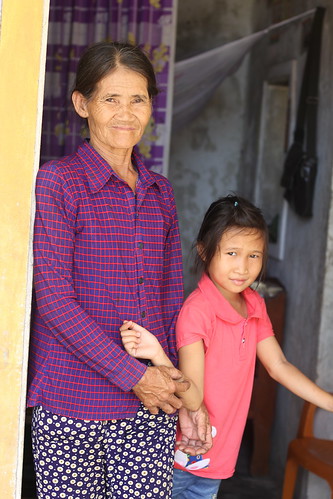 Ms. Duong Thi Hue and her granddaughter Ms. Hue is strength personified. The wrinkles on her face and her swollen hands concede her life’s challenges. She has had six children, five of whom fell victim to dioxin poisoning from the war. An elderly widow, she’s the sole caregiver and provider of three of her Agent Orange-affected children and one grandchild (name omitted).
Ms Hue’s daughters, Duong Thanh Binh, 29, and Duong Thi Hong Thanh, 27, live in padlocked structures behind her home. They developed mental disabilities and began exhibiting violent fits of rage when they turned 14 years old. At this point, Ms. Hue became incredibly scared of her daughters. Left with no recourse to help them and keep everyone safe (including neighbors), Ms. Hue was forced to lock them in separate rooms in 2013. She explains that she gives them medicine with their breakfast in the morning by slipping it into the rice. When they realize there is hidden medicine “they throw the food and break the bowls”.
There is no alternative to this. She would greatly prefer that her daughters live freely but in the times they’ve convinced her to release them, they’ve acted violently – going so far as to pull out a knife and threaten Mr. Thuan (the AEPD Outreach Worker). I struggle with this. I try to walk the fine line of being an observant learner of cultures and behavior, but sometimes I feel the urge to ask unanswerable questions. Is it ethical for her daughters to live contained for the rest of (at least) Ms. Hue’s life? What about their human dignity? Can Ms. Hue’s and her daughters’ suffering be addressed? By whom? How?
There is no question that Ms. Hue deeply loves and cares for her daughters. She would do anything to help them. And yet, I’m left confounded and irked at my privilege – a privilege that allows me to sit here and philosophize about her life. The harsh truth is that Ms. Hue does not have any other option. Morally, these questions should still be asked. Practically, they do nothing to help her.
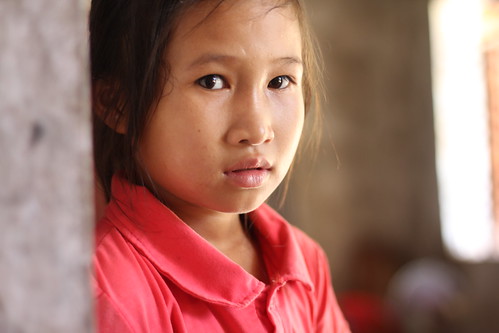 Ms. Hue’s granddaughter Ms. Hue speaks in hushed tones. Her ten-year-old granddaughter is sitting on the floor below the door frame playing with an empty plastic chair. Mrs Hue adjusts the fan in the other room before sharing the following information: Binh became pregnant with her granddaughter when she was 19 years old. Ms. Hue implies that her granddaughter was born from sexual assault. The little girl attends school and is smart, but despite her best efforts Ms. Hue is simply unable to raise her. She applied to an SOS orphanage village in the province but was rejected. The village administration expressed concern that the girl would begin exhibiting the same behavior as her mother in a few years and did not feel able to bear the liability of take the risk. Ms. Hue is desperately looking for somewhere safe to send her granddaughter.
A long conversation ensues between Ms. Hue and Mr. Thuan, the Outreach worker, who promises to support Ms Hue in finding a suitable and safe place for her granddaughter. Ms. Hue continues to speak in whispers. Through the door, I see that her son Duong Viet Thanh (24 years old) has returned from feeding the cow and calf in the fields. A strange tension fills the room. Thanh has recently been released from prison and Ms. Hue fears he has become more violent even than when he was first imprisoned. She suspects that his violent outbursts are the result of Agent Orange exposure and wishes he had been admitted for rehabilitation rather than jail.
Thanh walks into the home and through the door, where Ms. Hue’s granddaughter is sitting. He greets us and asks the girl to move over. When she does not, he assertively moves the plastic chair out of the way with his foot. Thanh retrieves something from the room and walks to the front yard. We’ve all fallen silent.
Quietly, Ms. Hue explains that her home is not safe for her granddaughter now that Thanh is out of prison. There are moments when he gets very upset and lashes out. Like other caregivers we work with, Ms. Hue understands that these violent outbursts are symptoms of the exposure but that there is nothing that can be done to help him. Mr. Thuan reiterates his pledge to help her granddaughter and respectfully asks why she does not ask Thanh to leave. She explains that she has come to rely on him for help with the cow and calf in the fields. Ultimately, however, Ms. Hue loves her son and wants him with her. She candidly admits, though, that she is worried.
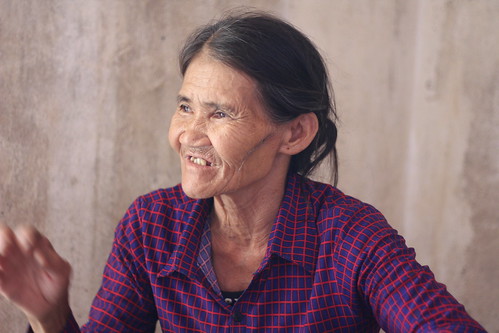 Ms. Hue and Mr. Thuan speak at length I notice the scab across Ms. Hue’s cheek and ask Ngoc if she is also a victim of Thanh’s violence. Ngoc was unsure, but based on context and the stories Ms Hue had been telling Mr. Thuan she thought it was possible. And again, I thought to myself: What policies, institutions, support systems are available to Ms. Hue and her granddaughter beyond an orphanage and AP’s campaign? How will her granddaughter’s mental health be impacted by her current reality? What about Ms. Hue’s mental health? Is there any way to prevent the violence by supporting Thanh?
Ms. Hue’s most pressing concern is the well-being of her childrenafter she passes away. Of all the other beneficiaries who we work with, Ms. Hue seems to me the most financially savvy. She is the only one currently saving money for the future and has explicitly mentioned saving now as a priority. The other families we work with are still creating the means to save in the future, but without any specifics. Ms Hue proudly tells us she has saved 45M VND.
Ms hue sold the cow in early 2018 for 7M VND because she was worried about an outbreak of cow disease that was plaguing the commune and felt more comfortable caring for a calf. This seemed to pay off when the calf gave birth just before we visited in mid-August. Ms. Hue also featured on a TV program earlier this year and received 38M VND from supporters. Having a good handle on her personal finances, she decided to save 100 percent of the charitable money and income from the cow sale to support her children’s future.
Ms. Hue’s life has been ravaged by the effects of Agent Orange. I sympathize deeply with her plight and admire her resilience.
AEPD is supporting Ms. Hue in looking for an alternative and safe place for her granddaughter and methods to deal with the violence.
Update by Mia Coward, October 2018
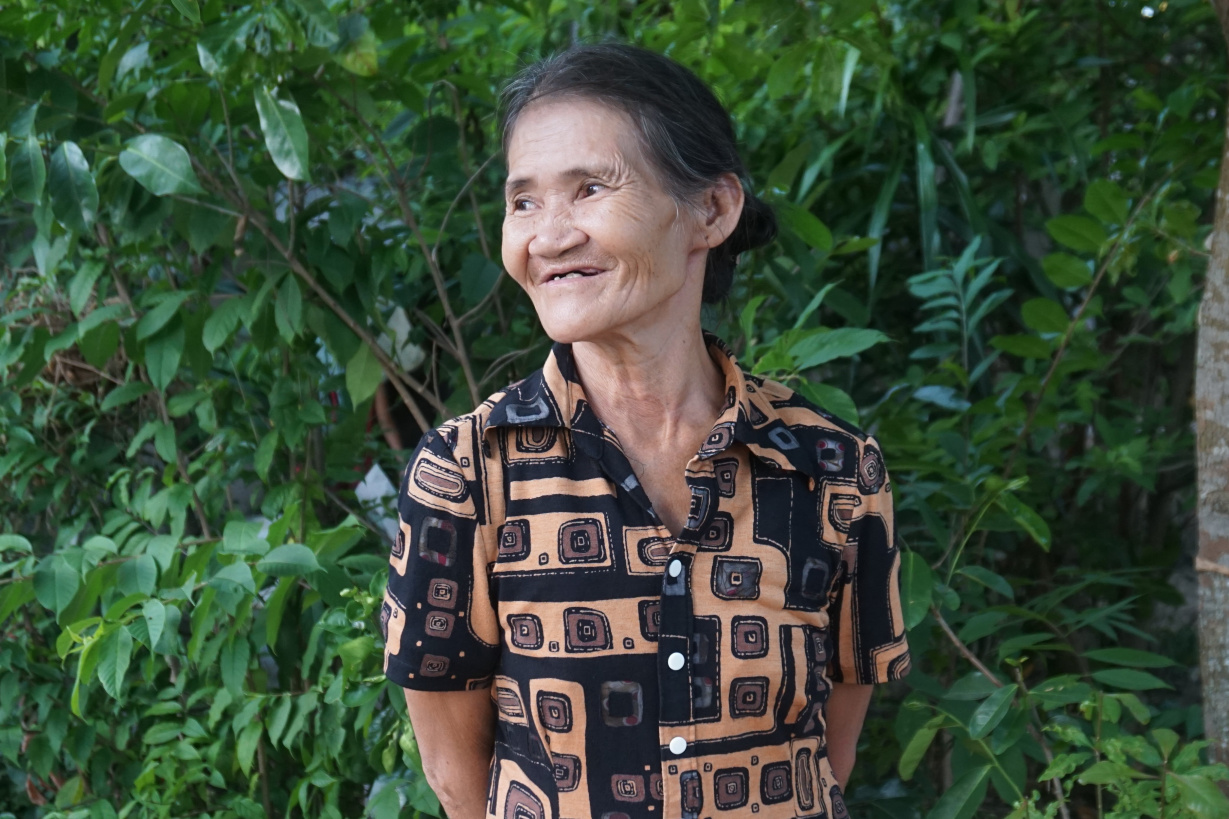 Ms. Hue Before meeting this family, I will admit that I was very anxious and even a tad nervous. After reading the blogs of both Karen (AP Executive Director) and past Fellow Marcela, I was totally unsure of what to expect when arriving at the home of Ms. Hue. We knew that she had been a soldier in the war and had been directly exposed along with her husband to Agent Orange. Her husband, who had kidney problems, died from hemorrhage and left her as the head of the household. Together they had six children, five of whom are victims of Agent Orange.
Two of Ms Hue’s daughters, Duong Thanh Binh and Duong Thi Hong, are extremely violent and suffer mental disabilities. When Karen was first introduced to the family, she found the girls in a cage-like room locked in the back on the home. Her son, Duong Viet Thanh, had been recently released from jail and lived with Ms Hue and her granddaughter. I knew from Marcela’s blog that this family had lived through a different experience than the other families and might have suffered from abuse and sexual violence in the household.
On the way to the house, Ngoc told me of two incidents. Recently, Ngoc had taken another AEPD partner to meet the family. The girls, who know some English, began to talk to him and tried to convince him that they should be allowed out of their cages. But Ms. Hue did not allow this because of a previous assault by her daughter. In the car, I tried not to think of the worst and remain calm.
As with the other families that we visit, the outreach worker drives on his motorbike ahead of us. We stop and walk the rest of the way. Ms Hue brings a table from inside the house and offers us water. There are flies everywhere and the smell of cow manure causes me to cough continuously. We are about to sit down when her son Thanh drives into the yard. I can feel the energy in the room shift. We stand and he greets us but Ms. Hue and her granddaughter say nothing. Thanh then disappears and I don’t see him again. As we began to engage in conversation, Ms. Hue tells us that her granddaughter is home for the summer.
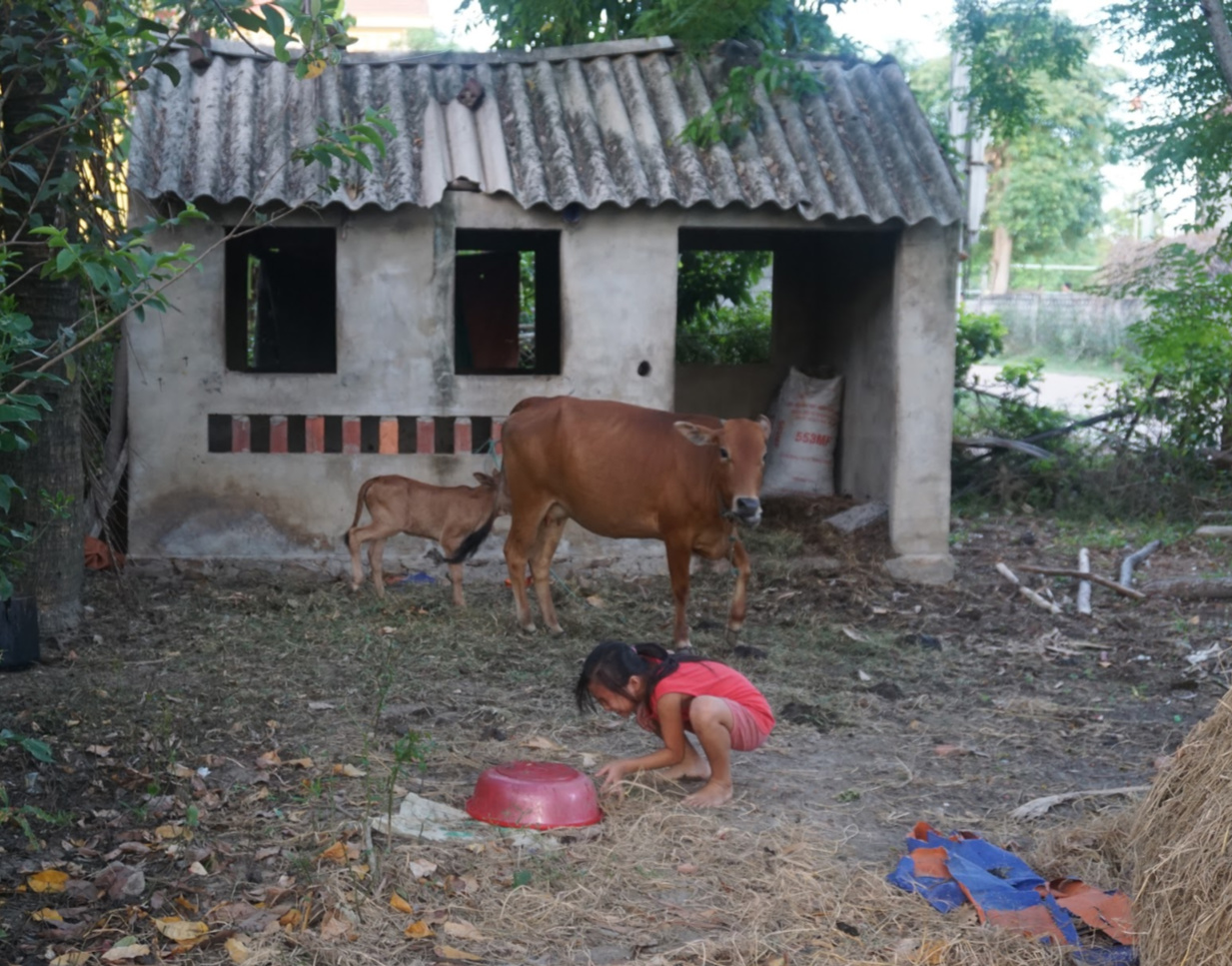 Ms. Hue’s granddaughter with the cow and calf Ms. Hue talks in a whisper during the visit, and sometimes I can barely hear what she is saying. She tells us that there because of the heat her daughters are more aggressive and violent and have take all of their clothes off. They are also refusing their medicine. When she tries to mix it with rice they eat around the medicine because they know that it is there.
Ms. Hue’s own health is so-so. As Ngoc strains to listen to Ms. Hue soft voice, I can hear the daughters in the back, yelling and talking. Ms. Hue looks around to make sure the Thanh is not around and explains that she is very scared of her son. Ngoc tells me they believe he has some mental disabilities but have not been able to get him help. Ms. Hue does not dare to say anything that would make him angry and become violent with her or her granddaughter. She still has not been able to find a better home for her granddaughter and is unsure if she can apply again.
Ms Hue was recently able to get some support from a local organization to repair the roof of the house after being highlighted through Facebook. In total, she was able to get 45M VND and spent 15M VND on the roof/home repair. Last year she sold the cow but kept the calf, which had now given birth 20 days before our visit. Ms hue now has a savings of about 37M VND. Just as we are talking about the cow and calf, the calf comes to the front of the yard. Ms. Hue cuts grass herself to feed the cow and calf . She has no other animals beside the cows and a wandering chicken that does not belong to her. Her previous chickens died from disease.
Ms. Hue receives 1.9M VND per month and her two daughters receive 1.2M VND per month. She is able to average about 2 to 4M VND of income per month but that money goes toward food for the household. She spends about 300,000 VND a month to fed the cow while it is feeding the calf, after which she uses grass and her banana tree to feed both animals. Her monthly bills for food and medicine average about 3M VND, but she still tries to save and dips into her savings whenever she needs more money for food.
Ms Hue took out a loan from the bank to coppensate the family attacked by her son and borrowed money from her daughter and cousin to pay back the bank loan. She has other, smaller, interest-free loans from relatives. Ngoc tells me that the loan from Ms Hue’s daughter is effectively a gift and that she can pay back the rest step by step.
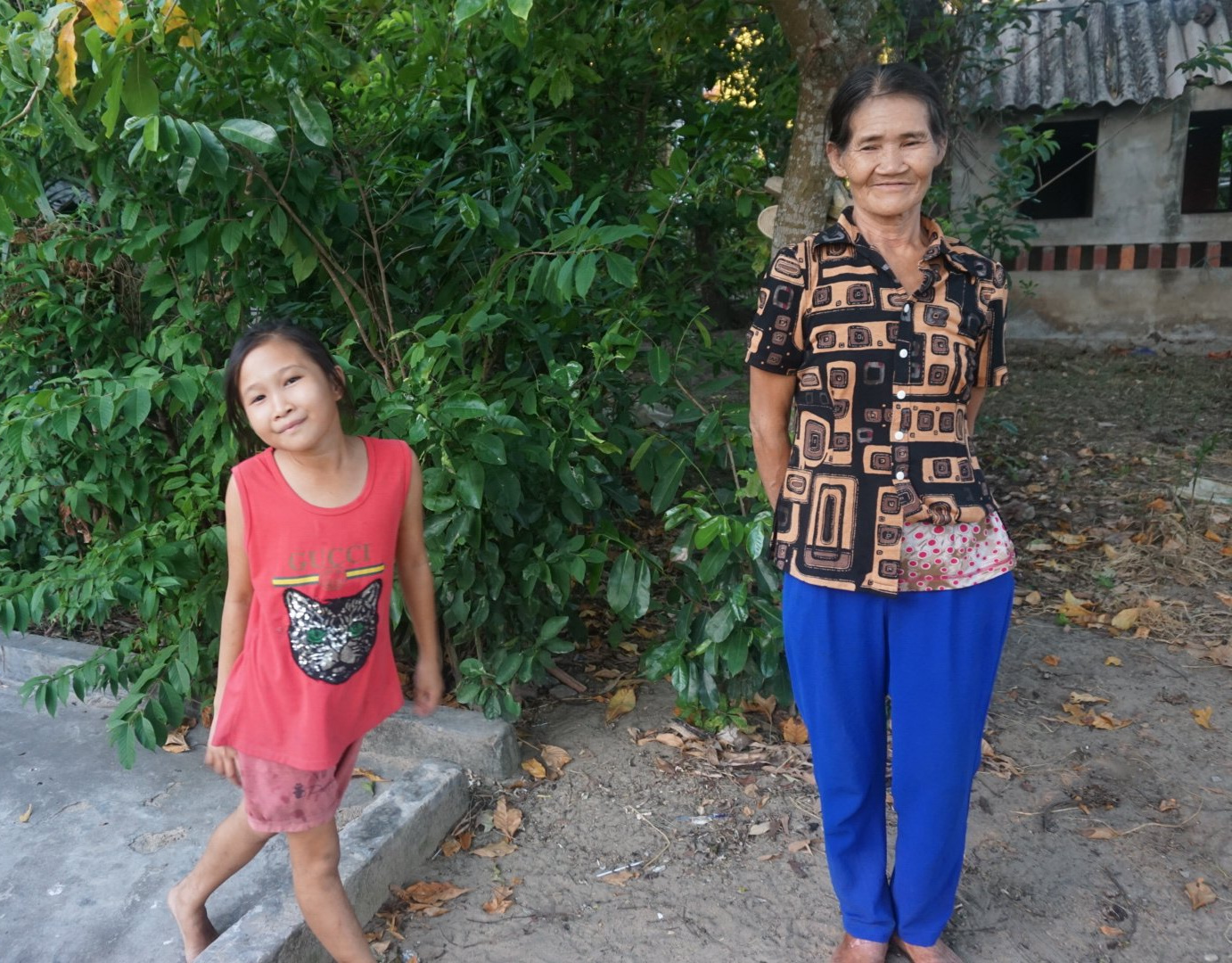 Ms. Hue and her granddaughter I now ask if there is a mental facility that her daughters could attend. While Ngoc translates I look around the home and try to get a smile out of Ms Hue’s granddaughter who seems distant, shy, and withdrawn. Ms. Hue had sent her daughters to an institution some time ago, but after about 3 months, the doctor at the center contacted her and asked if she had checked her daughters out, or if they come home. It turned out that the girls had escaped the center and managed to stay at a relatives house for several days.
Ms Hue only knew that they had escaped after the doctor called her. She tried to re-enroll them at the center again, but was refused because the doctors assumed they would try and escape again. There is a similar center in Dong Hoi that Ms Hue plan to visit, which is closer to home. We can hear the girls in the background, louder than before as if they know that their mother is talking abut them.
Ms. Hue is not interested in taking out any more loans because she does not want to owe any more money. She is certainly interested saving more for her family, but is unsure about joining a group. Ms. Hue tells us that if she was to receive another grant, she would use it one of two ways. One would be to place some in her savings account, the other to raise chickens – although raising chickens can be risky. She seems happier with cows.
The government offers a savings scheme for Agent Orange families, but not in Ms. Hue’s commune. She would be interested in joining if it became available. As we wrap up and I go take pictures, Ms. Hue seems hopeful for her daughter and for her family. As Marcela had written after her visit her resilience is amazing. I have to agree.
|